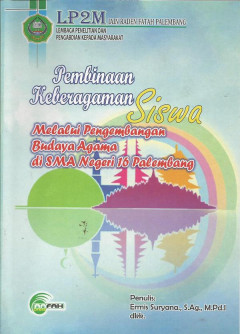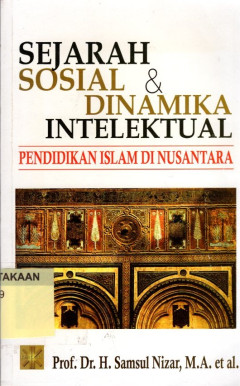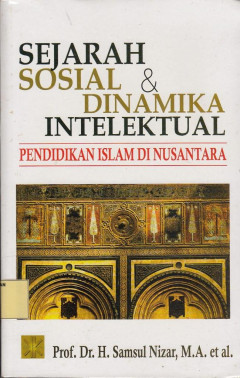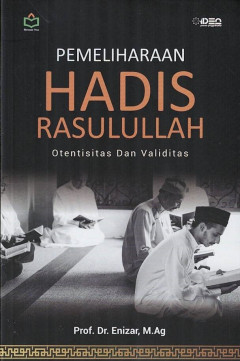Ditapis dengan

Pembinaan keberagaman siswa melalui pengembangan budaya agama di SMA Negeri 1…
- Edisi
- Cet. I
- ISBN/ISSN
- 978-602-1209-13-4
- Deskripsi Fisik
- ix, 133 hlm. : 21 cm.
- Judul Seri
- -
- No. Panggil
- Ref 2X7.3 SUR p
- Edisi
- Cet. I
- ISBN/ISSN
- 978-602-1209-13-4
- Deskripsi Fisik
- ix, 133 hlm. : 21 cm.
- Judul Seri
- -
- No. Panggil
- Ref 2X7.3 SUR p

Fiqih Muamalah 1
- Edisi
- -
- ISBN/ISSN
- 9786028686204
- Deskripsi Fisik
- vii, 136 hlm.; 15,5 cm
- Judul Seri
- -
- No. Panggil
- Ref 2x4.207 NIZ f
- Edisi
- -
- ISBN/ISSN
- 9786028686204
- Deskripsi Fisik
- vii, 136 hlm.; 15,5 cm
- Judul Seri
- -
- No. Panggil
- Ref 2x4.207 NIZ f

Sejarah Sosial dan Dinamika Intelektual : Pendidikan Islam Di Nusantara
- Edisi
- Cet.1.--
- ISBN/ISSN
- 978-602-9413-58-8
- Deskripsi Fisik
- xx, 372 hlm.;23cm.
- Judul Seri
- -
- No. Panggil
- 2X7.309'598 SEJ
- Edisi
- Cet.1.--
- ISBN/ISSN
- 978-602-9413-58-8
- Deskripsi Fisik
- xx, 372 hlm.;23cm.
- Judul Seri
- -
- No. Panggil
- 2X7.309'598 SEJ

Sejarah Sosial dan Dinamika Intelektual Pendidikan Islam di Nusantara
- Edisi
- Ed. 1, Cet. 1
- ISBN/ISSN
- 978-602-9413-58-8
- Deskripsi Fisik
- xx, 372 hlm.; 23 cm
- Judul Seri
- -
- No. Panggil
- 2X7.359'8 SAM s
- Edisi
- Ed. 1, Cet. 1
- ISBN/ISSN
- 978-602-9413-58-8
- Deskripsi Fisik
- xx, 372 hlm.; 23 cm
- Judul Seri
- -
- No. Panggil
- 2X7.359'8 SAM s

AKADEMIKA: Jurnal Pemikirsn Islam.--
- Edisi
- vol.20, no.01 januari-juni 2015
- ISBN/ISSN
- 1693-069x
- Deskripsi Fisik
- 194 hlm.:illus.;24 cm
- Judul Seri
- -
- No. Panggil
- 2X7.4 ENI a
- Edisi
- vol.20, no.01 januari-juni 2015
- ISBN/ISSN
- 1693-069x
- Deskripsi Fisik
- 194 hlm.:illus.;24 cm
- Judul Seri
- -
- No. Panggil
- 2X7.4 ENI a

Pretext for Religious Violence in Indonesia: An Anthropolinguistic Analysis…
is study uses an anthropolinguistic approach to examine two Majelis Ulama Indonesia (MUI) fatwa texts regarding Ahmadiyya. First, it shows that there are signiícant differences between the 1980 and 2005 fatwas. Second, in terms of their lexicon, the 1980 fatwa uses the phrase “di luar Islam” (outside Islam), while the 2005 fatwa uses the phrase “berada di luar Islam” (loca…
- Edisi
- Vol. 26, No. 3
- ISBN/ISSN
- -
- Deskripsi Fisik
- p 418-444
- Judul Seri
- -
- No. Panggil
- 2X0

Pemahaman Holistik Tentang Hukum Waris Islam: Perspektif Filosofis. E-jurnal
The Islamic law of inheritance has a very important position in the development of Islamic law. The Islamic law Scholars ‘and Quranic Commentators discussed many of these issues, from the classical period to the present day. Philosophy with its three branches: ontology, epistemology, and axiology are often used as a method to understand the nature of something. This article presents t…
- Edisi
- vol. 3, no. 1
- ISBN/ISSN
- 2528-1194
- Deskripsi Fisik
- p 2528-1224
- Judul Seri
- -
- No. Panggil
- 2 X 4. 4

Following the Global Rejection: The Motives of Majelis Ulama Indonesia’s …
This article examines the motives behind the decisions of the Majelis Ulama Indonesia (MUI), in 1980 and 2005, to issue fatwas condemning the Ahmadiyah. Using critical discourse analysis, this study reveals MUI’s motives behind its fatwas on the Ahmadiyah by drawing on the text and the context of the issuance of the fatwas. Underpinning MUI’s issuance of its fatwa on the Ahmadiyah…
- Edisi
- Vol. 29, No. 3
- ISBN/ISSN
- -
- Deskripsi Fisik
- p 519- 546
- Judul Seri
- -
- No. Panggil
- 2X4.591

George Tarabishi and criticism of hadiths, research in the book "From the Isl…
The well-known Syrian thinker and translator, George Tarabishi, presented a new view of heritage in his book “From the Islam of the Qur’an to Modern Islam,” in which he questioned many Islamic postulates, such as the legislative role of the Prophet Mohammed, and the status of his Sunnah. Mr. Tarabishi took a skeptical approach out of context towards the Prophetic Sunnah, and called t…
- Edisi
- Jilid.30 No.3
- ISBN/ISSN
- 2410-5201
- Deskripsi Fisik
- pp539-554; ilus
- Judul Seri
- -
- No. Panggil
- 2X9.14

Pemeliharaan Hadis Rasulullah : Otentisitas dan Validitas
- Edisi
- Cet. 1
- ISBN/ISSN
- 978-623-484-066-7
- Deskripsi Fisik
- 218 hlm.; 23 cm
- Judul Seri
- -
- No. Panggil
- 2X2 ENI p
- Edisi
- Cet. 1
- ISBN/ISSN
- 978-623-484-066-7
- Deskripsi Fisik
- 218 hlm.; 23 cm
- Judul Seri
- -
- No. Panggil
- 2X2 ENI p
 Karya Umum
Karya Umum  Filsafat
Filsafat  Agama
Agama  Ilmu-ilmu Sosial
Ilmu-ilmu Sosial  Bahasa
Bahasa  Ilmu-ilmu Murni
Ilmu-ilmu Murni  Ilmu-ilmu Terapan
Ilmu-ilmu Terapan  Kesenian, Hiburan, dan Olahraga
Kesenian, Hiburan, dan Olahraga  Kesusastraan
Kesusastraan  Geografi dan Sejarah
Geografi dan Sejarah